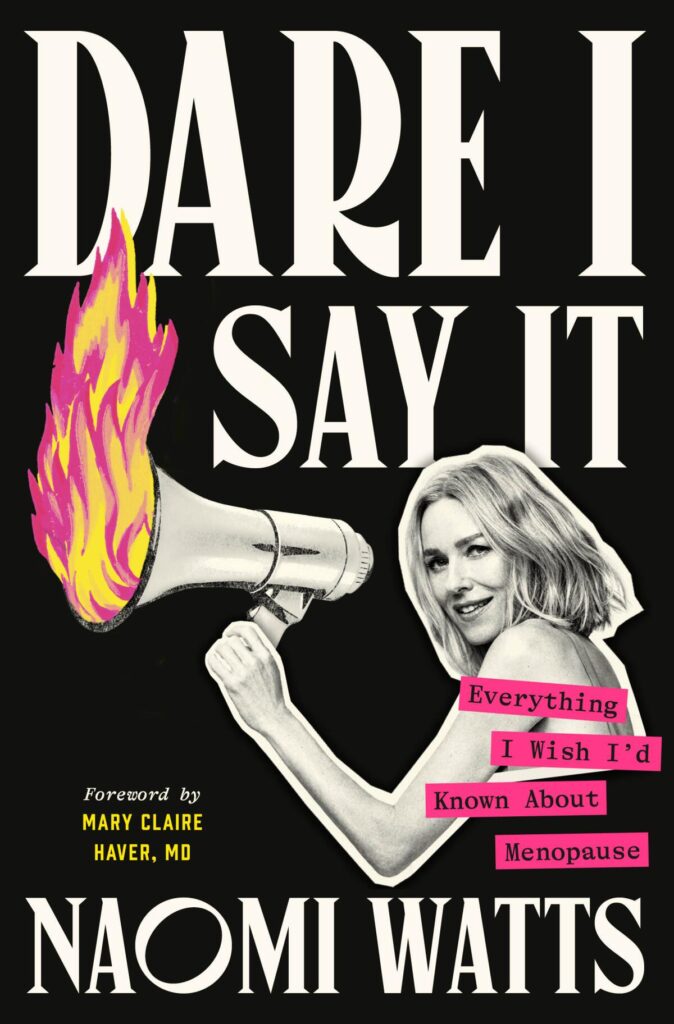On the Shelf
‘Dare I Say It: Everything I Wish I’d Known About Menopause’
By Naomi Watts
Crown: 256 pages, $29
If you buy books linked on our site, The Times may earn a commission from Bookshop.org, whose fees support independent bookstores.
“This will definitely end my career.” That was Naomi Watts’ initial response to the prospect of writing her first book, “Dare I Say It: Everything I Wish I’d Known About Menopause.”
Through her menopause-focused wellness brand, Stripes Beauty, and openness about her experiences with perimenopause in her late 30s while also trying to conceive her children with then-partner Liev Schreiber, Watts was already one of the foremost celebrities to address the aging process for women. “Dare I Say It,” to be published by Crown on Jan. 21, builds on her earlier efforts. It melds expert medical opinion, case studies from other women and Watts’ own experience.
“I hope it feels like an honest, cozy chat with a girlfriend and that will lead them to having that conversation in real time if they’re too scared to open up,” Watts says.
She’s candid about getting “baby Botox” (a small dose of the injectable) between jobs to preserve her facial expressions onscreen. The actor recently received Emmy and Golden Globe nominations for her performance as Babe Paley in Ryan Murphy’s “Feud: Capote vs. the Swans,” which she calls “a role of a lifetime. One of if not my best role.”
In her book, she shares an endearing anecdote about husband Billy Crudup, whom she married in 2023, assuaging her fears about exposing her hormone patch during their first tryst by pointing out the gray hairs on his testicles. “Those to date remain the most romantic words I’ve ever heard,” Watts writes.
That levity was intentional. “I was always wanting to bring humor into it because we know the pain points,” she tells The Times.
After overcoming her fear of the unknown as it relates to being a debut author, Watts aimed to write the kind of book she wished she had when she was struggling through symptoms alone. Watts’ mother entered menopause early too, at the age of 45, but they never spoke about it until Watts mustered up the courage to bring it up with her.
“I guess these are the conversations I didn’t have with you because my mother never had them with me,” Watts recalls her mother responding in “Dare I Say It.”
“I wished there was a book when I was suffering through it, flailing and filled with shame and doubt and confusion,” Watt says.
Perhaps the strongest part of “Dare I Say It” is when the book tackles HRT, or hormone replacement therapy, which got a bad rap in 2002 when a Women’s Health Initiative study asserted that HRT caused breast cancer and cardiovascular disease, among other health concerns. Watts writes that the study was actually commissioned to see whether HRT decreased risk of heart disease — it didn’t — and that it was stopped after researchers observed a slight increase in risk of breast cancer. Subsequent research has suggested that the benefits of the drug outweigh risks, especially for younger perimenopausal women. Advocates says HRT has been proven to help with bone density and to prevent or lower the risk of Alzheimer’s disease. This is not to mention the symptoms of menopause and perimenopause it’s most commonly used to treat.
“Women have been taught not to complain. To suck it up, this is a natural process, you must go through it,” Watts says. “But you don’t have to suffer. The bad studies that happened in 2002 just left us with so much fear.”
Watts stresses that she is not a doctor, and that everyone should discuss the best options for them with their own physician.
“But some doctors just say no without exploring that person’s medical history, and that is not OK. It’s because they’re not educated themselves,” she maintains.
“Dare I Say It” and other resources can act as a stop-gap for those without adequate support dealing with their symptoms.
“I tried to put together these doctors that I trusted, and it’s up to the reader to draw out of it the information they feel suits them,” Watts says. “If you come in with some preparation you can have a very nuanced conversation about what you’re experiencing, what your needs are and if this is right for you.”
Watts continues: “As one of the doctors says, we are still very connected to the misogynistic, patriarchal messaging that women are at our expiration date once our eggs are gone. That’s still there, no matter how far we’ve moved as a society. It’s just ingrained.”
Watts declines to directly respond to a question about incoming Vice President JD Vance’s seeming past endorsement of the view that the purpose of postmenopausal women is to look after their grandkids, simply saying: “Let the fact that I’m saying nothing say everything.
“We’re not going off to the corner and pulling out our knitting needles,” she says, “although I do love to knit.
“We have a lot left to do and it’s up to us to alter that messaging,” Watts continues. “Experience and time on the clock really matters. Women at this point in time have more experience, and we have something to offer to the younger generations.”
Other than grandchild care.
